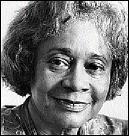Tribute to Lucille Mathurin Mair
Published: Saturday | January 31, 2009

The Editor, Sir:
I wish to express my regret at the passing of Ambassador Lucille Mathurin Mair and register my appreciation for her contribution to the field of Jamaican and Caribbean history.
Others will no doubt speak about her diplomatic career, her role as warden of Mary Seacole Hall and her contribution to the establishment of the Centre for Gender and Development Studies at the University of the West Indies (UWI).
Pioneering role
But I wish to focus on her pioneering role in the evolution of Caribbean women's history.
It was Mair who, way back in the 1970s, demonstrated the usefulness and revolutionising potential of the methodology of 'women's history', in the process "rescuing the female ghosts of slavery from an improper burial," to use Jenny Sharpe's formulation. And that at a time when gender was not on the agenda.
In 1974, she submitted and defended successfully a doctoral dissertation in history at the UWI, Mona campus. In it, she posed new questions and rejected old answers with respect to the experiences of women - free and enslaved, black, brown and white - in the slave system of Jamaica and in the first decade of freedom.
Over a period of three decades, it became the most sought-after unpublished work among students and scholars of Caribbean history and culture.
I am not aware of any other dissertation, anywhere within the libraries of the university, more persistently pursued.
We do not have to speculate about her motivation, objectives and challenges. In a 1990 semi-autobiographical speech she recounted:
"In the early 1960s, I started to seek out the women of Jamaica's past during the period of slavery, women of all classes and of all colours, black, brown, white. I was motivated mainly by intellectual inquisitiveness, the usual ambition of the doctoral candidate to investigate virgin territory, which it was at that time. There was almost nothing to guide such a search. There was, in fact, nothing in modern historical scholarship about the women who came before me. But this was not surprising, for historiography, which has for centuries been a male academic preserve, has been stunningly devoid of a consciousness of women as significant beings."
Daring to question
The academic culture at the time seemed assured that there was no urgency to research issues surrounding the experiences of women in any way other than the most general.
The manner in which their history impacted popular perceptions and institu-tional determinations with respect to their ascribed second-class citizenship was understood but not discerned as a crisis of the post-colonial nationalism.
Few scholars were willing to argue that this posture was a formidable part of the eruptive male intellectual leadership; and fewer still offered generalisations about the role of historiography within the reproduction of the patriarchal machinery of domination and exploitation.
The few were female, and Lucille Mathurin Mair was one of them. Those few are now many; and they are using her work in ways that will ensure that her legacy lives on.
I am, etc.,
VERENE A. SHEPHERD
verenalber@yahoo.com
Professor
Department of History
UWI, Mona


















